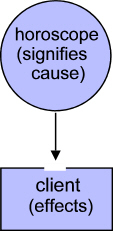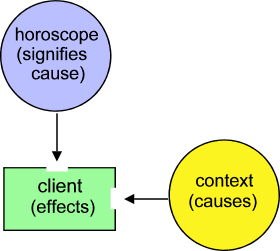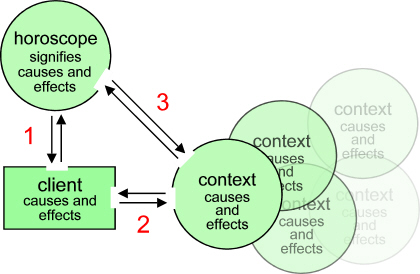home consultations courses ideas irish astrology Bill Sheeran
Introduction
During the summer of 1998 I presented a talk entitled Astrology and Cultural Attitudes to Order and Chaos in Vilanova, a village on the coast about 30 miles west of Santiago de Compostella in N.W. Spain. The organisers agreed to include an appendix to the talk in the written proceedings of the conference. This allowed me to expand on some of the points I was making in my spoken presentation. What follows below is an amended version of this appendix.
Process thinking and feedback loops
Appendix to a talk given at the 15th Iberic Astrology Conference, Vilanova, Galicia June 1998
| page 1 | | page 2 | | page 3 |
In a simple mechanistic system, the subject is separate from the object. The hammer hits the nail (cause) and the nail moves further into the wood (effect). This is usually considered as a one way flow of energy. The influence of the hammer completely dominates, and the influence of the nail on the hammer is disregarded as negligible. As an analogy, the equivalent concept in astrology would be that the patterns in the horoscope cause the events and changes which happen in a person's life (see fig. 1a.). An stronger expression of this mechanistic approach would be to say that the planets themselves actually cause the events in the person's life. Like the nail, the client has little or no say in the matter. This describes a closed system characterized by inevitability. There are no other important variables involved which can interfere with the outcome. Such a system is highly predictable. It can even be quantified, with accurate and precise measurements leading one to conclude what the necessary outcome will be. Failure is considered to come from using the wrong techniques, or insufficient understanding of the astrological mechanisms in operation.

Figure 1a. A "strong" structuralist scheme.
The system is closed, with no capacity for evolution. The horoscope signifies planetary influences and so on. These fully determine (or cause) the effects in the client's life, as well as fully defining personality and character traits. The information is encoded in the structure of the horoscope waiting to be translated. This scheme shows astrology at its most fatalistic. The mechanistic model is highly Saturnian, and theoretically completely predictable.
Fig l b.) below is a slightly softer version of a closed system, in that it admits more variables (in the form of contextual factors). This system is more complex than the one described above, but it is still closed and does not allow for evolution. Because of the added complexity, prediction is more difficult, but still theoretically possible. One has to make sure one factors all the contextual variables into the equations and then success will result. Failure results for the reasons stated above, and also from mis-reading the contextual factors which act as supplementary causes alongside the astrological causes. As in the last case, the client has no say in the matter, but has to necessarily submit to the influences.

Figure 1b. A "soft" structuralist scheme.
Both these systems are based on the assumption that life is wholly predictable in specific terms. Failures in prediction are due to the inadequacies of the astrologer. In practice, not many astrologers believe that either of these simplistic schemes show the full story. Or some may roll with the 'soft' structuralist scheme but resign themselves to the fact that the context is too complex to know well enough to ensure accurate specific predictions.

1. feedback between client and horoscope. 2. feedback between client and context. 3. feedback between astrological concepts and cultural factors.
Figure 1c. A "process thinking" scheme.
Fig 1 c.) shows a simple 'process thinking' scheme. In this case, the system is 'open', and there is mutual exchange between the different parts of the system. For example, the contextual factors have effect in the client's life, but experiencing these effects may cause the client to in some way change the contextual factors, which then have a different effect subsequently in the client's life, and so on in a feedback loop. A key aspect of this perspective is that the client's context contains the astrologer. In the other two schemes, the astrologer is detached from the system - an observer engaged in translation of code.
Copyright © 1998 Bill Sheeran | next |